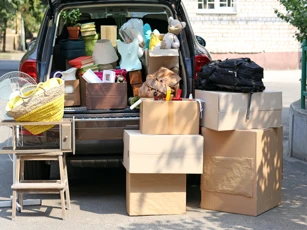 Written by: Danny Belton - Head of Lending
Written by: Danny Belton - Head of Lending
Moving home and buying a house is exciting, but sometimes the costs can take us by surprise. Budgeting is an important part of moving home, so let’s talk about the costs involved, including stamp duty, solicitors fees, and moving costs.
Find tips for saving money below!
How much does it cost to buy a house?
It’s important that you consider stamp duty, legal fees, surveys, and your deposit when looking at the cost of moving house. The biggest expense when buying a house is usually the purchase itself, but it’s not the only thing to consider.
To get started, let’s look at how much a mortgage might cost you. Try out our mortgage finder to get an estimate of costs and what’s currently available.
Let’s talk about some of the other costs you need to consider for that initial move:
Stamp Duty
The amount you pay for Stamp Duty depends on the value of the property. There are some exceptions and reliefs available, and the costs differ for first time buyers, but here’s what you need to know:
Existing homeowners
Property value and Stamp Duty Land Tax rate:
Up to £125,000 - 0%
From £125,001 to £250,000 - 2%
From £250,001 to £925,000 - 5%
From £925,001 to £1,500,000 - 10%
Anything above £1,500,000 - 12%
First time buyers
Property value and Stamp Duty Land Tax rate:
Up to £300,000 - 0%
From £300,001 to £500,000 - 5%
Anything above £500,000 - no discount offered
Legal fees
You’ll need to hire a solicitor or conveyancer to handle the legal aspects of the purchase, but costs can vary based on where you are and the solicitors experience. You can most likely expect to pay a fixed rate or an hourly fee.
Before your solicitor can start work, you’ll likely need to pay an upfront fee of £250 to £5001 so they can start ordering property searches. Total costs could go up to £1,000 to £1,500.
Solicitors will work through a series of tasks and checks for you, including:
- Legal checks: These checks make sure that the property you’re buying is free from any legal issues, including title and boundary checks, planning permissions, and if the property is a leasehold, verifying the terms of the leasehold and ground rent.
- Contracts: The solicitor will review and negotiate the sale contract on your behalf, and this will include ensuring that the contract is fair and protects your interests.
- Searches: These check if there are any issues or restrictions on the property, including local authority searches, water and drainage checks, and environmental searches.
- Paperwork: Solicitors will draft and review contracts, complete the property information form, prepare the deed transfer, and handle the exchange of contracts
- Money transfers: Your solicitor will handle the transfer of funds between you and the seller on completion day and will likely handle the transfer of your deposit before this.
Get quotes from several sources to find a price that works for you, but be sure to work with a reputable solicitor, conveyancer, or firm.
Surveys
A survey is an inspection of a property to assess its condition and if there are any problems or defects. There are a few different surveys, each with increasing levels of detail and cost:
|
Survey type |
Average cost |
|
Level 1 (Condition Report): A basic inspection |
£300 |
|
Level 2 (Homebuyer Report): A more comprehensive survey |
£450 |
|
Level 3: A full structural survey |
£550 |
|
New build snagging report |
£450 |
Keep in mind that the cost of a survey will depend on the type you choose, the size and age of the property, and the location.
Deposits
Your deposit can be anything from 5% of the property’s value and will need to be paid a few weeks before the purchase is completed. This will be around the same time that contracts are exchanged.
Your solicitor will pay the deposit to the seller’s solicitor, so you don’t handle the exchange.
Your deposit will determine how much you can borrow, so try our borrowing calculator to get a sense of your average buying power.
How much does it cost to sell a house?
According to Compare My Move, the average cost of selling a house is £6,9242. This includes estate agent fees, tax and legal fees, and miscellaneous costs such as removals and storage.
The total cost will vary depending on where you are in the country, and the type of property you’re selling. Let’s break down what that might look like:
Estate agent fees
Estate agent fees are typically a percentage of the sale price of the property, usually around 1-3% of the home’s sold price. The exact percentage will depend on the location and value of the property, as well as the terms of the agency agreement.
There are different types of agency agreements, including:
- Sole agency: This means the agent has exclusive rights to sell the property.
- Multiple agency: The property is listed with multiple agencies.
- No sale, no fee: This is a strategy sometimes used by estate agents in which they only charge a fee if they sell the property.
Compare fees and terms offered by different estate agents to find a deal that works for you.
Tax and legal fees
You might need to pay capital gains tax on any profit you make from the sale of a property. There are exemptions and reliefs for this, particularly for those who are selling their main property.
The legal fees when selling a house look similar to buying and include:
- Solicitors fees
- Conveyancing costs
- Searches
- Transfers of deeds
Removals and miscellaneous
The cost of moving house in 2024 may include removals van hire, storage, cleaning, utilities disconnection fees, and even packing materials.
Though smaller in cost, they can add up, so be sure to leave room in your budget. According to Checkatrade, you can expect to pay around £50-£80 per hour3 for two removals specialists and a van. For long distance moves, they say you can expect to add around £35 per hour and £1.50 per mile.
Ways to save money when moving house
Planning in advance, clearing your clutter, and finding creative ways to pack your fragile items can all help with money saving and moving. While the actual cost of moving house will vary based on where you are and your needs, here are some quick tips to help you save money when moving house:
- Clear your clutter: This could mean fewer boxes, and less to pay
- Compare prices on reputable companies: This will apply to all services and could help you save a bit of money
- Timing is everything: Some services may be cheaper in quieter months
- Book in advance: If you can’t move in the quieter seasons, book well in advance to ensure you get a spot
- Ask if there are discounts: Some companies will do discounts for students, key workers, armed forces, or old age pensioners.
- Good time management: To make the most of your time with the removals company (and avoid more hourly rates), make sure you’re packed and have easy access to the property on the other side. Be sure to disconnect and drain washing machines and dishwashers ahead of time.
Talking to an adviser
Getting a mortgage can take anywhere from a few weeks to a few months, so if you're moving house soon, talk to a mortgage adviser sooner rather than later is vital.
They can help find you a deal that works for you, taking into account your personal financial circumstances and situation.
Talk to us today and let's see what we can do for you.
Frequently asked question
Yes, you should always tell your bank when you move home. Your address is an important security measure, and keeping it up-to-date is vital.
You should give at least 48 hours’ notice before you move, but ideally you want to let them know 28 days in advance.
You must tell HMRC if you have changed your address. Inform them once you have moved and make sure you take out a mail redirection service to ensure any correspondence doesn’t go to the old address.
Tell your council as soon as you have completed the purchase of your new property. Inform the council where you are moving to as well.
Sign up to our monthly newsletter
Stay up-to-date with all the latest mortgage news and homebuying tips with our monthly newsletter. Jam-packed with helpful information and advice, you'll always know what's happening in the industry and how it might affect you.
Whether you're a first time buyer or getting ready to remortgage, we're here for you with helpful tools, articles and information delivered straight to your inbox.
Important information
Your home may be repossessed if you do not keep up repayments on your mortgage.
There may be a fee for mortgage advice. The actual amount you pay will depend on your circumstances. The fee is up to 1% but a typical fee is 0.3% of the amount borrowed.
References:
Related Articles
Incentive schemes to buy a new build home
Owning a new build house could be easier than you think…
How to buy or sell your house fast
With house prices on the up, now could be a good time to sell your house.
Moving house tips
Now that you've bought your new home, it's important to make sure you are ready for the big move.
No posts currently available




